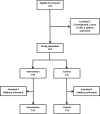The effect of monetary incentive on survey response for vulnerable children and youths: A randomized controlled trial
- PMID: 32396564
- PMCID: PMC7217457
- DOI: 10.1371/journal.pone.0233025
The effect of monetary incentive on survey response for vulnerable children and youths: A randomized controlled trial
Abstract
Aim: In surveys non-responders may introduce bias and lower the validity of the studies. Ways to increase response rates are therefore important. The purpose of the study was to investigate if an unconditional monetary incentive can increase the response rate for vulnerable children and youths in a postal questionnaire survey.
Methods: The study was designed as a randomized controlled trial. The study population consisted of 262 children and youth who participated in an established intervention study aimed at creating networks for different groups of vulnerable children and youths. The mean age of the participants was 16.7 years (range 11-28) and 67.9% were female. The questionnaire was adapted to three different age groups and covered different aspects of the participants' life situation, including the dimensions from the Strengths and Difficulties Questionnaire (SDQ). In the follow-up survey, participants were randomly allocated to two groups that either received a €15 voucher for a supermarket together with the questionnaire or only received the questionnaire. We used Poisson regression to estimate the differences in response rate (Rate Ratio RR) between the intervention group and the control group.
Results: The response rate was 75.5% in the intervention group and 42.9% in the control group. The response rate in the intervention group was significantly higher than in the control group when adjusting for age and gender (Rate Ratio, RR 1.73; 95% CI 1.38-2.17). We did not find any significant differences in scales scores between the two groups for the five scales of the SDQ. In stratified analyses, we found the effect of the incentive to be higher for males (RR 2.81; 95% CI 1.61-4.91) than for females (1.43; 95% CI 1.12-1.84).
Conclusions: Monetary incentives can increase the response rate for vulnerable children and youths in surveys.
Trial registration: The trial was retrospectively registered at ClinicalTrials.gov Identifier: NCT01741675.
Conflict of interest statement
The authors have declared that no competing interests exist.
Figures
References
-
- Coughlin SS, Aliaga P, Barth S, Eber S, Maillard J, Mahan CM, et al. The effectiveness of a monetary incentive on response rates in a survey of recent U.S. veterans. Surv Pract. 2011;4: 1–8.
Publication types
MeSH terms
Associated data
LinkOut - more resources
Full Text Sources
Medical


